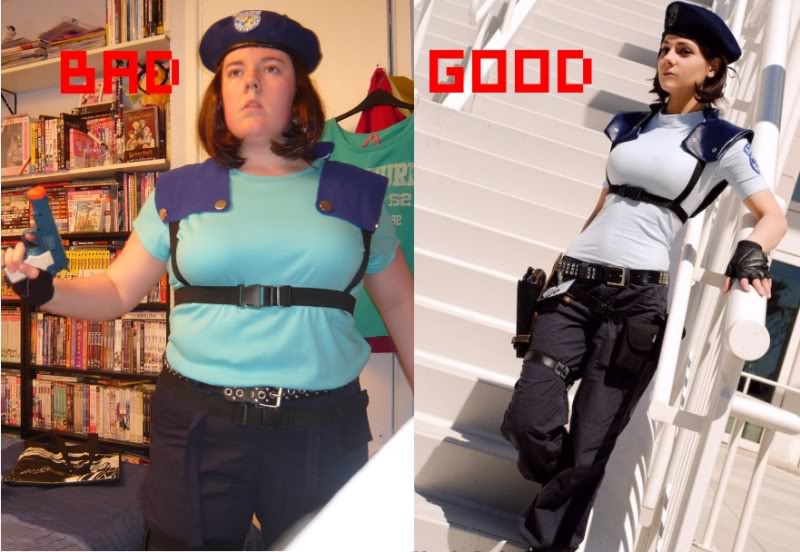
Playing down the “othering” of Cosplay: NY Comic-con
There I was, standing on the lower platform of the Javits Center, looking out into the crowd of thousands, packing themselves into the 2013 New York Comic Con. Directly in front of me were two double-sided escalators jammed with bodies – young and old- all anxious to buy, see, and commune.
Over the horizon line of people, I saw something- a wall of tall, lanky, white men in light, tan suits beginning to trickle down the escalators.Squinting, I tried and figure out what this anomaly in the amalgamation of colorful con-goes could be.Then I realize what I’m seeing — a streaming deluge, an army of people dressed up as Dr. Who.
Okay, well not the real thing, but hundreds of fans, all dressed up as the character flooding the main floor. And what ends this procession of time traveling troubadours, but a finale of cardboard and plastic Daleks – perfect.
This display of ultimate fandom is called cosplay. A term originating in Japan around 1984 , cosplay is the act of dressing up like a character from video games, comic books, anime, movies, or anything from pop culture. Often people will adopt the persona of their character to participate in masquerades and contests during conventions.
I am not a cosplay expert but no stranger to the phenomenon, and have even donned a poorly fitting bodysuit (or two) over my years of con-going. However, the cosplayers at New York Comic Con showed more dedication to the hobby than I had ever seen before.
Besides the spontaneous Doctor Who parade I already mentioned, there was a nightly dance party jam packed with hundreds of Harley Quinn’s, discussion panels steeped in hours of cosplay analysis, daily costuming competitions and parades, and even speed dating sessions full of cosplayers.
The overall feeling of this sect of fandom is one of warmth and acceptance – at least that is what I though during my few casual dalliances into the activity. And why wouldn’t it be? Cosplay like many other areas of fandom, ” …is a vehicle for many marginalized subculture groups to pry open a space to adress their cultural concerns within dominant representations.” It is a very reciprocal culture. If you need an extra pair of lime green tights or a needle and thread to patch up your body suit, you can almost always count on another cosplayer to help you out.
The dedication of some of these people to the culture is remarkable. While in the bathroom I encountered a number of women fixing their elaborate makeup or organizing pounds of brightly colored faux hair, many of whom traveled hundreds of miles with three or more suitcases of costumes. One girl, while touching up her Effie Trinket lip stick, told me that she spends over $5000 a year on cosplay and does not regret a cent. Another girl, attempting to balance her 5-foot wooden sword against a stall door told me
“this is what it’s about. A few days out of the year you can be anyone, surrounded by hundreds of people who love pretending they are something greater than they are.”
I question if this is what cosplay really is for most people. Are conventions this idealist utopia of “nerd culture”, an affinity space which allows everyone to exploit the depths of their fandom without judgment or shame?
Ten minutes of eavesdropping while standing in lines paint a slightly different picture. If taste represents a social system and not just a personal choice, what social systems are being created on these convention floors? Who are the leaders and who is left on the outside looking in?
I believe cosplay to be actively participating in the object of your fandom in its most emersive form. You are paying money for the costume- sure – but then once that costume goes on, you can step into the world of your favorite character. You are not reading about the character or watching the character on screen – you are that character or at least acting as him in real life. You can then go on to manipulate the likeness of that character with creative alterations or mash-ups which function as home improvements that refit prefabricated materials to the desires and tastes of the fan.
It is an obvious stating of your allegiance. And for the best and most well known cosplayers, it’s a declaration of your tastes to the world, which can hopefully build up social status within the community.
At conventions there is a clear bit of snobbery that takes place. Convention goers, maybe people ostracized for their unconventional tastes, take great pride in creating the new “cool/uncool” which is often played out in a fan’s cosplay choices and commitment to the character. Why just dress up as Gambit from Marvel’s X- Men, when you can go around all day speaking in a Cajun accent? The commitment is one way cosplayers set themselves apart as “serious”. Mark Duffet, writer of Understanding Fandom commented on this very issue when he wrote:
Hierarchies of acceptability are sometime reproduced in fan communities. On one level it appears to be a reenactment of the external process of labeling to ward off what is seen as the “worst” elements.
While waiting in discussion panel lines, there was no shortage of cosplay bashing. Such subjects that were often looked at as the “worst elements” were people dressed up as characters outside of their races, ages, or physical presentations.
In the cosplay community, people are often urged to disregard these facts of real life and dress up however they please, yet multiple times during the convention I heard whispers of condemnation over the Spiderman who has “really let himself go” (insert snicker) or the fifty- year old who is playing “Wonder Woman’s grandma”( insert eye roll).
Communities are often made stronger through shared interest and not shared social characteristics so this “othering” and labeling is doing nothing but breaking down a community that is often misunderstood everywhere else.
While sitting in on the Geeks of Color panel, they discussed the idea of race and cosplay – another area of “othering” within the community. Since many minorities are underrepresented across the genres, they feel like they have very little options regarding costuming? Emmanuel Ortiz,one of the panelists talked about being Hispanic and having to sustain disparaging comments regarding his choice to dress up as Captain America.
After that particular panel let out, I hung around to chat with some of the other observers. One African American woman dressed as Rogue from Marvel’s X- Men told me that she
“…spent hours agonizing over costumes. I could’ve been Storm. I even started to put the costume together. But I hate Storm. I realized the only reason I was going to do her was because she was black and it would save me from hearing a lot of crap.”
Those sentiments were echoed by Chaka Cumberbatch, an African American cosplayer who was referenced during the panel. In her post over at xojane she said: “While at the Sailor Moon shoot, I chatted up and befriended a photographer who took the now infamous picture of me that would eventually go on to accompany numerous blog and forum posts arguing about whether or not black people should cosplay outside of their race.”
After that particular photo went viral, she had to withstand the barrage of anonymous comments such as ”… if she has to insist on “ruining characters,[she] could have at least picked one with black hair so it looked more “natural.”
The issue of race in fan culture is a complicated one to say the least, and unfortunately despite the overwhelming warm aura of acceptance that permeates of cosplaying community,the practice of “othering” still goes on.
If snobbery and small-mindedness are weakening the ties in this community, what is keeping them together? I guess I cannot escape mentioning the Heroes of Cosplay reality series on SciFi. This show, though unrelated to a number of the panels I sat in on, kept coming up. Fans continuously bashed Heroes of Cosplay because of its portrayal of women, minorities, and the cosplaying community as a whole.
I wonder how much of this fan outcry is due to the fact that a major corporation is commercializing on and marginalizing their “fandom”. Like most fans, cosplayers feel a strong personal connection to their community. Getting the outfit just right can take months and hundreds of dollars and now SciFi is, as some fans feel, shamelessly misrepresenting the experience and dedication that goes into cosplay. The show plays off of stereotypes surrounding “geek-culture” and in many ways, propagates those same narrow-minded and raciest attitudes that cosplayers are trying to escape in their real lives by coming to conventions.
However, while watching groups of cosplayers sitting on concrete floors ferociously decrying the show, it became clear that it was just another thing that brings this community together. Their persecution at the hands of the Scifi network is yet another link in their community experience. What upsets one, upsets them all.
Leaving the convention today, surrounded by ninjas, princesses, and Jokers, I went back to my initial experience of meeting the wall of Doctor Who’s and I wondered if cosplay is a true attempt at being something greater than we are or just an excuse to dress up and go speed dating.
I think, it might be a little of both.
Written with StackEdit.
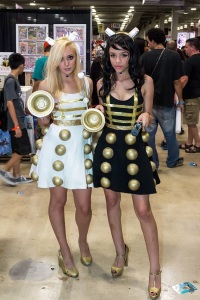
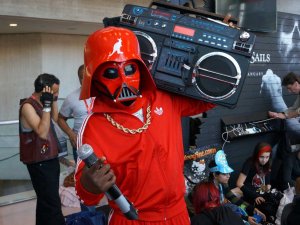
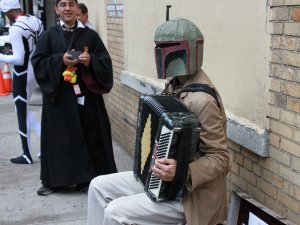
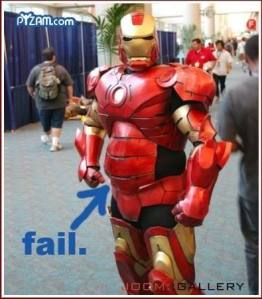
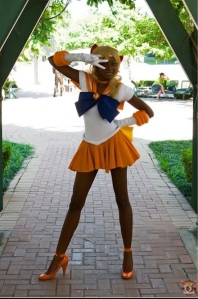
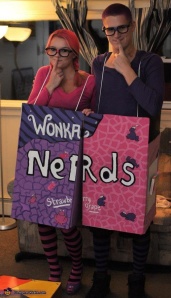
The racial comments merely prove that subcultures that think they are different or intellectually separate or ‘better’ than society because of their non-traditional interests aren’t.
I was at a con about 12 years ago, and got into a conversation about cosplay and body image. My friend said to me, “If you were to do Star Wars cosplay, the only character you could do right would be Jed Porkins.” http://starwars.wikia.com/wiki/Jek_Tono_Porkins
So what did, “do right” mean back then? My friend wasn’t trying to be offensive or insulting, but, in his mind, the only Star Wars character I could do and not make it seem foolish would be…the fat guy. Because anything else would seem like I was making a mockery of the character, possibly, or I couldn’t reflect the character in the right image.
I think that says a lot about the fan community: there’s a sense of possessiveness about the characters, or settings, or genres, that they just won’t allow themselves to see past (or that they want to hold sacred). It goes beyond, “you’re not doing it correctly,” to, “you aren’t showing it enough respect.”
Are they right? Depends on the structure of the community. Historical reenactors have rules about how authentic you should be. And so do some fan clubs (see the 501st Legion: Stormtrooper cosplayers. http://www.501st.com/).
Cosplayers like Chaka Cumberbatch and the woman in the featured image cosplaying as Jill Valentine are literally engaging in textbook textual poaching. What we see here is the delineation Jenkins created between “misreading” a text and “poaching” one, debunking the idea that there lies only one “correct” interpretation of a text and all others are inferior (33). However, “an individual’s socialization into fandom often requires learning “the right way” to read as a fan, learning how to employ and comprehend the community’s particular interpretive conventions (89).
Perhaps because cosplayers are dressed as fictional characters, boorish men see them as the objects they’ve viewed in comics and movies, and thus don’t consider the feelings of the person underneath the costume? And though Peter Capaldi was cast as the 12th Doctor Who, there were <a href="http://www.telegraph.co.uk/culture/tvandradio/doctor-who/10218253/The-time-is-right-for-a-female-Doctor-Who.html" writers calling for a female doctor in major news publications . I hope this means we’re moving in the right direction with gender equality in culture in general. There are just too many depressing stories about women being mistreated popping up, and it never gets any easier to read them.
[…] Playing down the “othering” of Cosplay: NY Comic-con […]
I can’t remember if any of the texts of yet have discussed the problems of fandoms-inherenly marginalized-displaying the same exclusive tendencies that the mainstream does. Obviously, Duffet has in regards to levels of fandom, but in regards to the racial/gender treatments. Lots of geeks are quick to point out how meanly they are treated but are quick to pay it back in turn.
[…] Playing down the “othering” of Cosplay: NY Comic-con […]